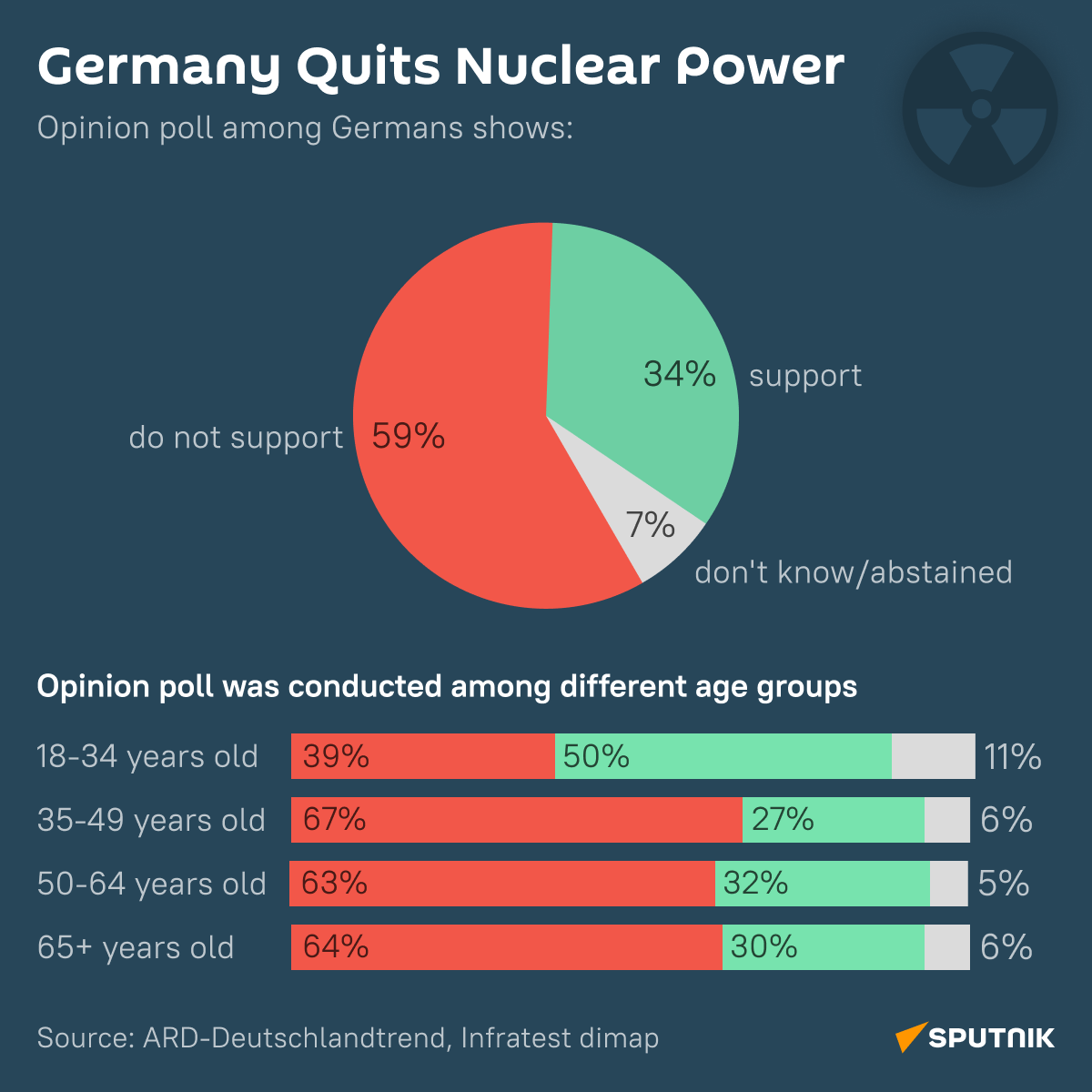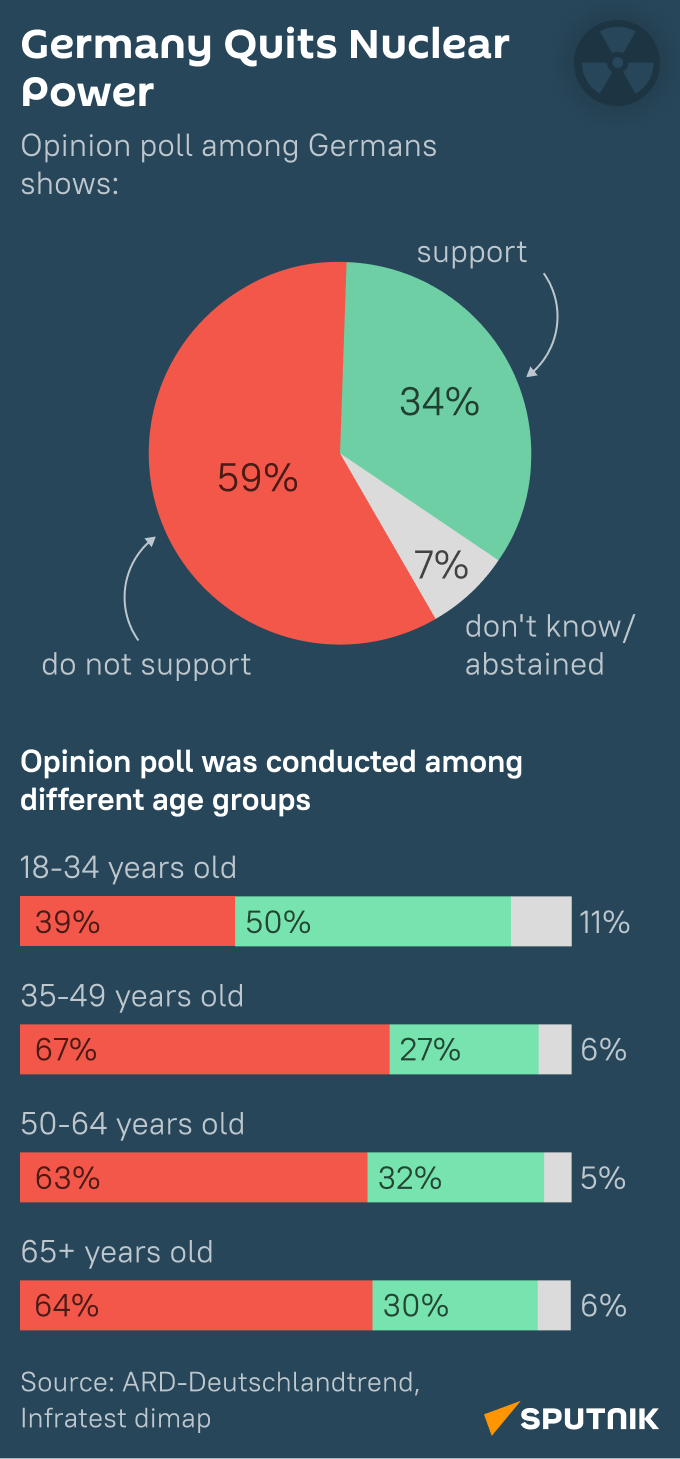https://sputnikglobe.com/20230415/germany-turns-its-back-on-nuclear-power-generation-1109560976.html
Germany Turns Its Back on Nuclear Power Generation
Germany Turns Its Back on Nuclear Power Generation
Sputnik International
On April 15, Germany proceeded to shut down the three remaining nuclear power plants in the country as Berlin seems poised to continue its transition to renewable energy generation.
2023-04-15T16:13+0000
2023-04-15T16:13+0000
2023-04-15T16:13+0000
world
germany
nuclear power plants
shutdown
infographic
npp
nuclear energy
nuclear power
https://cdn1.img.sputnikglobe.com/img/07e7/04/0f/1109561414_0:0:1280:720_1920x0_80_0_0_d7acc1f44109a8b58e0a529be06adcaa.png
As reactors are being disconnected from the German power grid and shut down, the radioactive materials that were used to fuel these plants will be kept in spent fuel pools for a few years before being moved to interim storage facilities.This development takes place as Germany finds itself in a precarious situation energy-wise, with fuel prices soaring as the country finds itself cut off from cheap Russian oil and gas due to the destruction of the Nord Stream pipelines and thanks to the anti-Russian sanctions imposed by the EU over the ongoing conflict in Ukraine.“While many countries in the world are even expanding nuclear power, Germany is doing the opposite,” complained Markus Soeder, current minister-president of Bavaria. “We need every possible form of energy. Otherwise, we risk higher electricity prices and businesses moving away.”While environmentalist groups in Germany planned to celebrate the reactors’ being shut down, German authorities have already admitted that the country would have to rely on natural gas and pollution-heavy coal to generate electricity until they can improve solar and wind power generation capabilities.The decision to put an end to nuclear power generation in the country was made by German authorities years ago, with the disaster at the Fukushima Daiichi Nuclear Power Plant in Japan in 2011 apparently prompting Berlin to accelerate their nuclear phase-out.The opinions in Germany about the closure of the nuclear power plants seem to be divided, local media outlets point out.Claudia Kemfert, an economist from the German Institute for Economic Research, argued that not postponing the shutdown is “not a mistake,” adding that the plants could have been switched off at the beginning of this year “without the lights going out in Germany."At the same time, Andre Thess from the Institute for Energy Storage at the University of Stuttgart insisted that operating a single nuclear power plant would have allowed the country to “save about 10 million tons of CO2 per year,” which amounts to “the emission of one million inhabitants of the Federal Republic of Germany."
1
germany
Sputnik International
feedback@sputniknews.com
+74956456601
MIA „Rossiya Segodnya“
2023
News
en_EN
Sputnik International
feedback@sputniknews.com
+74956456601
MIA „Rossiya Segodnya“
Sputnik International
feedback@sputniknews.com
+74956456601
MIA „Rossiya Segodnya“
germany, german npp, germany shuts down last npp, nuclear power, nuclear energy, energy crisis
germany, german npp, germany shuts down last npp, nuclear power, nuclear energy, energy crisis
Germany Turns Its Back on Nuclear Power Generation
On April 15, Germany proceeded to shut down the three remaining nuclear power plants in the country as Berlin seems poised to continue its transition to renewable energy generation.
As reactors are being disconnected from the German power grid and shut down, the radioactive materials that were used to fuel these plants will be kept in spent fuel pools for a few years before being moved to interim storage facilities.
This development takes place as Germany finds itself in a precarious situation energy-wise, with fuel prices soaring as the country finds itself cut off from cheap Russian oil and gas due to the destruction of the Nord Stream pipelines and thanks to the anti-Russian sanctions imposed by the EU over the ongoing conflict in Ukraine.
“While many countries in the world are even expanding nuclear power, Germany is doing the opposite,” complained Markus Soeder, current minister-president of Bavaria. “We need every possible form of energy. Otherwise, we risk higher electricity prices and businesses moving away.”
While environmentalist groups in Germany planned to celebrate the reactors’ being shut down, German authorities have already admitted that the country would have to rely on natural gas and pollution-heavy coal to generate electricity until they can improve solar and wind power generation capabilities.
The decision to put an end to nuclear power generation in the country was made by German authorities years ago, with the disaster at the Fukushima Daiichi Nuclear Power Plant in Japan in 2011 apparently prompting Berlin to accelerate their nuclear phase-out.
The opinions in Germany about the closure of the nuclear power plants
seem to be divided, local media outlets point out.
Claudia Kemfert, an economist from the German Institute for Economic Research, argued that not postponing the shutdown is “not a mistake,” adding that the plants could have been switched off at the beginning of this year “without the lights going out in Germany."
At the same time, Andre Thess from the Institute for Energy Storage at the University of Stuttgart insisted that operating a single
nuclear power plant would have allowed the country to “save about 10 million tons of CO2 per year,” which amounts to “the emission of one million inhabitants of the Federal Republic of Germany."



